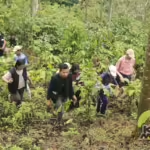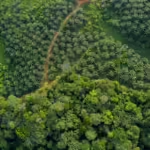Indigenous peoples are vulnerable to agrarian conflicts. The human rights perspective must be prioritized in devising policies and solutions.
Indigenous peoples’ land rights are often not recognized and protected by formal law. This is due to various factors, such as legal uncertainty, agrarian conflicts, and the exploitation of natural resources by irresponsible parties.
Lampung University vice-rector for Student Affairs and Alumni Anna Gustiana Zainal believes customary land rights will contribute to reducing global warming.
Anna conveyed this in a national seminar titled “Protection of Land Rights of Indigenous Peoples in Facing Global Warming” at the university’s postgraduate program, quoted from the university’s website.
“Through this forum (seminar), we hope to jointly formulate concrete steps to protect indigenous peoples’ land rights in the face of global warming issues,” said Anna, who is also a lecturer at the university’s social and political sciences faculty.
Development and investment policies that ignore community rights create increasingly complex agrarian problems.
Atnike Nova Sigiro, Chair, Komnas HAM
Murhadi, the director of the postgraduate program said that the seminar was attended by 100 participants, including faculty leaders of Lampung University, several Lampung customary leaders who are members of the Lampung Customary Balancing Assembly (MPAL), officials from Lampung administration, and postgraduate students and doctoral candidates.
Murhadi said that the seminar aims to produce recommendations for the government on the protection of customary forests, especially in Lampung.
Indigenous forests are in a vulnerable position
On July 27, 2023, Komnas HAM declared the agrarian conflict a priority issue. This was conveyed during a meeting with the Indonesia Forum for Environment (WALHI) West Kalimantan chapter and other civil society organizations.
A number of issues were also raised, including the situation that occurred at the borders of West, East, and North Kalimantan; development and investment policies; determination of customary forest areas, transmigration programs, and independent integrated cities; National Strategic Projects (PSN); and protection of indigenous peoples’ rights in agrarian conflicts.
Atnike Nova Sigiro, chairwoman of Komnas HAM said that the commission would dive deeper into the issues that had been submitted. “Komnas HAM responds or takes steps that can and need to be taken. We can assess the handling model after this meeting because some will be case-based,” said Sigiro.
Ultimately, policies are made at the expense of people, local communities, or indigenous groups. And indigenous peoples’ struggle is weakened in various structural ways.
Abdul Haris Semendawai, External Vice Chair, Komnas HAM
Development and investment policies that ignore community rights, Sigiro added, create increasingly complex agrarian problems. Komnas HAM has also received many public complaints related to development and investment policies that ignore the rights of local communities living in potential agrarian conflict areas.
Research and assessment commissioner Saurlin P. Siagian also observed that these cases can be registered as public complaints and immediately followed up by the commission. “There were several cases and they needed to be recorded. If it can be reported and registered in the Complaints dossier, then there can be concrete follow-up,” said Siagian.
Customary forest establishment
Komnas HAM will implement several strategies to encourage agrarian conflict resolution in Indonesia. One of which is to encourage the implementation of standard norms and regulations on human rights to land and natural resources among relevant stakeholders.
“Our Komnas HAM regulations related to natural resources are available to you all in the field. It can be used to strengthen the work of protecting indigenous peoples, farmers, and environmental activists in the field,” explained Siagian.
The commission also coordinates with related institutions including the environment and the agrarian ministry/land agency. This is to encourage the establishment of customary forest areas and the resolution of agrarian conflicts in various regions of Indonesia.
Abdul Haris Semendawai, external vice chair of the commission commented on the position of people in agrarian conflicts. “Ultimately, policies are made at the expense of people, local communities, or indigenous groups. And indigenous peoples’ struggle is weakened in various structural ways,” said Semendawai.
Semendawai also said indigenous peoples are very vulnerable and weak. He emphasized the importance of a human rights perspective approach to agrarian conflicts.
The meeting is expected to pave the way to encourage the resolution of cases as well as the improvement, progress, and protection of human rights related to agrarian rights and natural resources, especially at the border.
- Get to know forest healing to relieve stress
 Forest healing activities aim to introduce psychological therapy that can be used to relieve various types of psychological symptoms.
Forest healing activities aim to introduce psychological therapy that can be used to relieve various types of psychological symptoms. - Fires, encroachment and land conversion are the causes of forest loss in West Kalimantan.
 A strategy that prioritizes sustainable development is needed to save West Kalimantan’s forests.
A strategy that prioritizes sustainable development is needed to save West Kalimantan’s forests. - Orangutan dies in resident’s garden, back wound caused by sharp object
 The death of the female orangutan was due to hunting or deliberate actions by humans, resulting in the killing of protected animals.
The death of the female orangutan was due to hunting or deliberate actions by humans, resulting in the killing of protected animals. - Loss of farmer life on industrial plantation in Kalimantan’s forest
 The forced eviction of gardens in Lelayang Hamlet to use industrial forest plantations left local residents with deep trauma.
The forced eviction of gardens in Lelayang Hamlet to use industrial forest plantations left local residents with deep trauma. - The struggle of indigenous women in Mentawai to get clean water
 Exploitation of the forests of South Pagai and North Pagai Islands in the Mentawai Islands has caused indigenous women to have difficulty obtaining clean water.
Exploitation of the forests of South Pagai and North Pagai Islands in the Mentawai Islands has caused indigenous women to have difficulty obtaining clean water. - The role of customary forests in reducing global warming
 Indigenous peoples are vulnerable to agrarian conflicts. The human rights perspective must be prioritized in devising policies and solutions.
Indigenous peoples are vulnerable to agrarian conflicts. The human rights perspective must be prioritized in devising policies and solutions.









